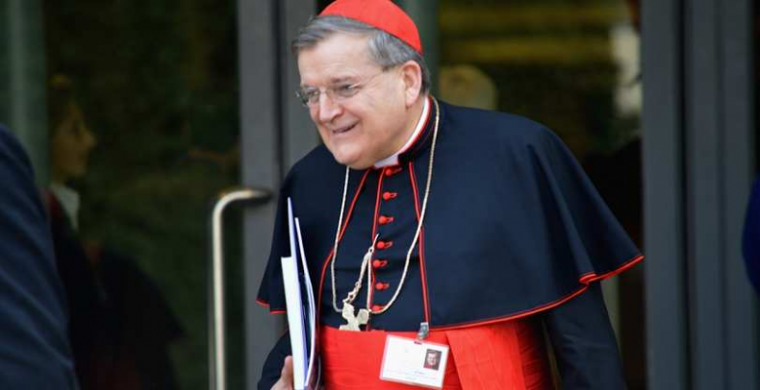How Cardinal Burke welcomed home a gay activist
By Steve Weatherbe
https://www.lifesitenews.com/
November 1, 2014
(VOL is running this story not because I or VOL have decided to go to Rome but because it speaks providentially of God's grace and eloquently to loving the sinner while hating the sin and being prayerfully persistent with one man caught up in a deadly and dangerous lifestyle.)
Cardinal Raymond Leo Burke emerged from the recent, tempestuous Extraordinary Synod on the Family as a champion of orthodox Catholic sexual morality just as Pope Francis has removed him from the Church's most senior canon law posting.
However, if you sit across the Church leadership's widening cultural gap from the former archbishop of St. Louis, as Alicia Ambrosio, producer and host of Vatican Connections on Canada's Salt and Light Television, evidently does, you see him as stuck in "an ivory tower" cut off from "the messiness of life" that homosexual Catholics contend with.
Now a testimony from one of those homosexual Catholics has resurfaced on the Internet, saluting Cardinal Burke for helping him to escape, rather than live in, that so-called messiness, and to reclaim his Catholic birthright.
"While some malign Archbishop Burke for his fidelity to God, Church and all souls, I say that he is a true shepherd of the faithful and a present day Athanasius."
Former homosexual activist Eric Hess, writing three years ago in Celebrate Life magazine, broke with several cherished dogmas of militant homosexuality in recounting how he returned like the Prodigal Son and found a warm welcome from the man he once spurned.
Hess' first heresy was to name the cause of his homosexuality--a dreadful relationship with an alcoholic father who frequently beat his mother "in addition to threatening me and my brother." Hess writes how he reacted by looking for a substitute father in his teens and thought he had found one in a teacher until the latter took advantage of his vulnerability to seduce him.
While this account dovetails with what psychology had concluded by the mid-20th century as an explanation for homosexuality and a basis for treatment, fierce lobbying by the homosexual lobby forced both the psychology and psychiatry professions into suppressing it in the mid-70s. Both groups now meekly toe the line dictated by the gay lobby, which preaches, without evidence, that homosexuality is innate, and therefore immutable and untreatable.
But Hess goes further, ascribing to Pope Paul VI's prediction that the Pill, by disconnecting sexuality from its Divine purpose, promoted not only homosexuality, but adultery, abortion, and embryonic stem cell use--all expressions of people reduced to "sexual objects."
In 1995, after four years of trying to combine sporadic Catholic worship with fulltime homosexual cohabitation, Hess gave up, and melodramatically "boxed up all my crucifixes and Bibles and dropped them off at the office of the bishop of La Crosse, Wisconsin with a letter renouncing the Catholic faith."
That would be Bishop Raymond "Ivory Tower" Burke. To Hess' surprise and chagrin, Bishop Burke responded kindly, saying he respected Hess' decision but would pray for his return. A self-described "gay activist," Hess was outraged at the bishop's "arrogance," and wrote back to accuse him of harassment and instruct him to never write again. But Bishop Burke did write again, one last, kind letter, promising to obey Hess' dictate, but also promising, "if I should want to reconcile with the Church, he would welcome me back with open arms."
Of course, Hess was having none of this, he thought, but when he told his lover three years later, after a short but intense period of prayer and discernment led by a parish priest, that he needed to return to the Church, the lover responded, "I knew all along that this day would come. Do what you need to do to be happy."
Hess then describes the wonderful welcome he received. His parish priest heard his confession and found him a Catholic family to live with until he could find a new apartment. As for Bishop Burke, when Hess called at his office to reconcile, "he embraced me." He also wondered if Hess remembered the package of Catholic objects he had left there in his anger, which, of course, Hess did. The bishop had kept them, in the belief that Hess would return, and now he gave them back.
Hess recounts how he then considered--and studied for--the priesthood but ultimately concluded his vocation was to "faithfully live the single life" in chastity.
But some "apostate" priests (mostly in their 50s and 60s) still try to convince him, even from within the Confessional, that God wanted him to reactivate his homosexuality. These men were not helping him, he writes. "As someone who suffered in the state of mortal sin for many years, I assure you that there is no happiness outside of the moral order."
The man who has helped him was his bishop, who let him leave the Church so he could return to it. "While some malign Archbishop Burke for his fidelity to God, Church and all souls, I say that he is a true shepherd of the faithful and a present day Athanasius," Hess wrote. "I tell you that he remains a mentor and an inspiration to me. Although my own biological father rejected me, Archbishop Burke became my spiritual father by lovingly representing our Father in heaven."
END














